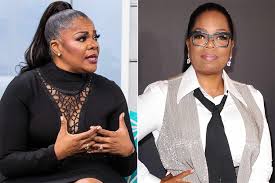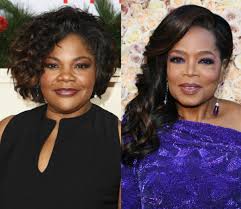Everyone sees Oprah as one of the most loving people on Earth, but is that really the case? Actress Monique has accused Oprah of betrayal, claiming Oprah invited Monique’s abusive family onto her talk show without her knowledge. They were close friends until then, but when Monique spoke out, feeling she’d been taken advantage of, it seemed to make things even worse.
“For eight years, my family and my career have suffered,” Monique said. “When I finally confronted Oprah Winfrey, she needed to stop hiding. People are starting to see her for who she really is.”
Many people reacted with disbelief, saying, “How could you say that? Oprah is human too—she has feelings and will eventually pass away. If you have something to say, you should just say it.”
The falling out between Oprah and Monique is more complicated than it seems. Both grew up in abusive homes, and Monique had always admired Oprah since she was young.
“I grew up as a plus-sized Black girl in Baltimore, Maryland, and I remember seeing a plus-sized Black woman on TV one day. I ended up going to visit the studio where she worked, and when I met her, I told her, ‘When I grow up, Miss Winfrey, I want to do what you do.’ She looked at me and said, ‘You know, it takes a lot of hard work.’ So, I put in the work and eventually became a stand-up comedian, just like I dreamed.”
As our paths continued to cross, Oprah and I grew closer. She once told me, ‘When I look at you, I’m really seeing myself.’ We connected over stories about our mothers, and it felt like we had a special bond.
When I got my big break with the film “Precious,” it was an amazing opportunity to work with Lee Daniels, an old friend, and Oprah too. People were used to seeing me as a comedian, so my dramatic role was a bit of a shock.

I told Oprah, ‘Which designer are you into? You need to get that dress ready for the Oscars!’ Monique’s performance became the talk of the town, and suddenly, producers wanted to fly her all over the world to promote the film. But by then, her focus had shifted.
When the studio asked her to go to the Cannes Film Festival in France, she politely declined, saying, ‘I’ve done everything required in my contract with Lee Daniels, and that’s where my commitment ends.'”
“Why wouldn’t she want to go to Cannes? By that time, she’d been through two failed marriages. By her third marriage, she was craving time with her family. When they reached out, I had a few days of downtime. I wanted to spend that time with my husband and kids, so I told them, ‘I’m going to pass. I’m spending this time with my family.’ They all agreed.”
Monique thought she had the support of everyone—Oprah, the producers—but things were far from supportive. “During the campaign, she was making unreasonable demands. ‘You need to play ball. This isn’t just show; it’s Show Business.’ The backlash only intensified. I was labeled as difficult for saying just one word: ‘no.’ I stood up to some very powerful people, and what Tyler Perry, Lee Daniels, Oprah Winfrey, and Lionsgate showed me was that if you don’t do what we want, we can ruin your career.”
But Monique’s troubles didn’t stop there. As she faced professional backlash for not playing along, she was also hit with a personal betrayal she never saw coming. That’s where the situation took a deeply personal turn.
Oprah Winfrey called in a rush and said, “My brother wants to come on the show.” Monique asked, “Your older brother, the one you described as a monster who abused you?” Oprah confirmed, “Yes, from when you were seven.” Monique pressed, “Are we talking about sexual abuse?” Oprah replied, “Yes.”
Oprah then said, “If you don’t want me to have your brother on the show, I’ll cancel it. I wanted to check with you first.” Despite Oprah’s offer to back her up, Monique soon saw commercials featuring her brother, her mother, her father, and her other brother.
The real impact of this situation hit home when we started talking about our relationships with our parents during our discussion about my brother. Monique was clear about her feelings: “If Oprah Winfrey had told me she was bringing my mother onto the show, I would have shut it down immediately. It’s one thing to be betrayed by someone you thought was a friend, but it’s even worse when that person knows how deeply it would hurt because they’ve been through similar things.”

Monique felt Oprah made a major misstep by not addressing this directly. At a party, Monique confronted Oprah and said, “You shouldn’t have needed to have this conversation. Why did you put my mother on your show?” Oprah replied, “If you think I did something wrong, I want to apologize.”
Monique responded, “Yes, Oprah, you did something wrong. You planned to have my parents on your show without even telling me.”
Even after this confrontation, Oprah never apologized. She has largely avoided talking about Monique in interviews and instead said, “You can’t fight negativity with more negativity; it only creates more negativity. You have to rise above it, transcend it, and be the light.”
By this point, Monique had had enough of powerful people taking advantage of her. “You start to notice deals you had just slipping away. Things begin to seem off. I’m not backing down, because when I see Oprah Winfrey, another Black woman, being thrown under the bus over a lie, I won’t stay quiet. I won’t just disappear. I won’t give up.”
So when Netflix offered her a deal she felt was unfair, Monique decided to push back. “The offers didn’t make sense. If we keep accepting these low offers, how can we ever make a change? I have to speak up and call it what it is: unfair.”
What was so unfair about the offer? Netflix proposed $500,000 for a comedy special, while comedians like Amy Schumer were getting $10 to $11 million. “Half a million is a lot of money, but when you compare it to $11 million, it’s not just about the amount—it’s about the principle. Monique had an impressive resume, including an Oscar and a talk show. She wasn’t just some unknown.”

Monique ended up suing Netflix for discrimination. Did she win? They settled, though the details weren’t made public. But she did agree to work on a special and a film with Lee Daniels, who apologized to her: “I am so sorry for hurting you in any way.”
Monique didn’t back down, even against those more powerful than her. She fought because she knew this wasn’t just about her—it was about helping others. “If standing up helps the next young woman get fair wages, be treated right, and earn respect, I’ll take that on. I’ll do it if it means the next person gets what she deserves.”



